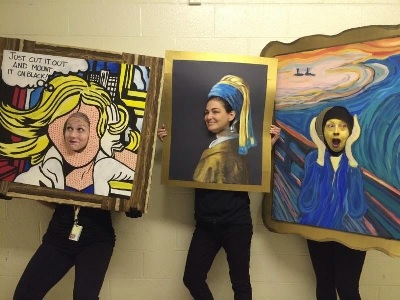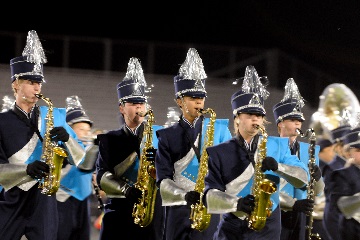 If you keep up with education news at all, you know all the usual struggles – class sizes, standardized testing, general hostility towards educators by whoever’s looking to score points with conservatives that week, etc. One of the biggies is the ongoing battle to keep the arts in public education. Every time budgets are tight (and they usually are), one of the first things to go is music, or the visual arts, or drama. Even when those classes survive, they’re the first to become “dumping grounds” for students who’ve shown no particular interest in anything but have to be SOMEWHERE. “Hey, anyone can draw a picture or hit a drum, right?”
If you keep up with education news at all, you know all the usual struggles – class sizes, standardized testing, general hostility towards educators by whoever’s looking to score points with conservatives that week, etc. One of the biggies is the ongoing battle to keep the arts in public education. Every time budgets are tight (and they usually are), one of the first things to go is music, or the visual arts, or drama. Even when those classes survive, they’re the first to become “dumping grounds” for students who’ve shown no particular interest in anything but have to be SOMEWHERE. “Hey, anyone can draw a picture or hit a drum, right?”
Either way, we as a society continue to show a dismissiveness towards the arts which we’d never tolerate towards Algebra III, Indiana State History, Astronomy, or even Basketball. We still claim to value reading, but our focus is increasingly utilitarian. Why waste time and energy reading books for pleasure? (Even many otherwise wonderful English teachers express horror at the stuff their kids read if given “too much choice”; presumably, unless it’s “good for you,” we shouldn’t be reading it in school.) And the idea that students should be encouraged to WRITE anything not purely academic… perish the thought!
Given the kind of money we’re all apparently happy to pay to watch pro sports, download music, go to movies, or read fiction of questionable quality, this strikes me as something of a paradox. Plus, it’s stupid.
Of all the terrible ideas we’ve heard in recent years regarding public education (and there’ve been a LOT of them), few do more immediate and universal damage than cutting arts programs. Thomas Jefferson once said that if he had to choose between “government without newspapers or newspapers without a government, I should not hesitate a moment to prefer the latter.” In the same spirit, I’d like to explain why in dark times such as these, if given the choice between focusing more resources on “academic” programming or pouring it into arts education, I’ll gladly argue for the latter.
1) Well-Rounded Students Are Better Students
Pretty much every civilized nation in the history of mankind has included some variation of the arts in whatever education its people determined to be appropriate. The Ancient Greeks pushed plenty of music, drama, and literature right alongside all that math and philosophy we still celebrate today. The Classical Chinese valued poetry, music, and calligraphy as much as math or political philosophy. No upscale European education was considered complete without instruction in formal dance and a thorough familiarity with classic literature.
Participating in arts education tends to increase achievement in more mundane academic subjects as well. This is a useful point to bring up for school boards or grumpy administrators, but let’s not get too sidetracked by this little pedagogical bonus. If you ask me about my favorite books, musicals, songs, or paintings, and I respond by carrying on about how the newest Bowling For Soup album really helped me focus on repairing the fence in my back yard or explain that I’m counting on an upcoming local production of Something Rotten to help me better strategize ways to reduce credit card debt, I doubt you’d invite me to your next cookout.
Sadly, you’d miss my talk on how the culinary arts make us better at plasma physics.
Supporting the arts because of their positive impact on other subjects is a bit like dating a girl because she has so many attractive friends. The arts matter because of what they are and what they do – all by themselves. The rest is gravy.
2) The Arts Promote Social & Emotional Learning (SEL)
Yeah, I said it. Educators simply must refuse to stop using useful terms any time the disingenuous or ignorant appropriate them for their own propaganda and demagoguery.
Social and Emotional Learning (SEL) refers to a very important, but very normal, part of growing up and learning how to become a useful member of a complex society. It’s all the stuff that goes into figuring out who we are individually as well as collectively and learning how to manage our emotions and respond to the emotions of others so we can function in small groups, large groups, or alone.
Any time you decide not to eat an entire bag of Double Stuff Oreos because you’ll ruin your dinner and feel gross afterwards, you’re demonstrating SEL. Any time you set aside your phone so you can focus on finishing your math homework first, that’s SEL. Taking a deep breath when your co-worker is being difficult and trying to figure out what’s going on with him before responding (instead of simply screaming, crying, and throwing coffee on him) shows you’ve managed some SEL. In short, if you’ve ever successfully managed a team, contributed to a discussion, or participated in a book club or Bible study, congratulations – you must have learned a little SEL somewhere along the way.
Probably in school.
The alternative, of course, is to become a sociopath – completely isolated and unable to process or accommodate the opinions, feelings, or ethical constraints of others. You can go halfway and settle for only caring about people just like you and refusing to understand anyone or anything beyond your own closed little world, but that’s not usually the most profitable or personally fulfilling course.
Music, drama, literature, and the arts are all different ways of exploring the human condition and the experiences, insights, and emotions of others. We don’t have to emulate or even “like” every character or idea expressed in order to benefit from understanding them better. It’s also likely that we’ll continually discover more about our own thoughts, feelings, hopes, fears, dysfunctions, and potential as we “become” others by singing their songs, reading their words, or acting out their lives.
Empathy isn’t a touch-feely weakness the left uses to force out God and make room for socialism. It’s a form of understanding – of wisdom. It’s related to the same internal imaginings which allow us to learn history or better understand political or economic principles. It’s why we’re able to care about our families and friends enough to argue about what’s best for them. It’s also why most of us don’t want to shoot up our schools or workplaces, and why we’re so hurt and angry at those who enable such things. Even if you don’t like most other people, some general understanding of their feelings and beliefs, not to mention a few basic “people skills,” are essential for success in most professions or communities.
It’s not just the emotions and ideas of others, of course. Art helps us confront and recognize our own desires, fears, lusts, hopes, and foibles as well. Emotions should never be in complete charge of our choices, but they DO matter, and understanding them is part of becoming a mature, self-reliant individual able to function in a complicated world.
3) Art Challenges Us
You’ve probably heard that court jesters in the Middle Ages could often say things to royalty that would result in imprisonment or execution for anyone else. Whether or not this was universally true, art (including humor) often communicates difficult or unpopular ideas in creative, engaging ways and challenges us to question our own thoughts, feeling, and assumptions about almost anything.
The stand-up comedy of Lenny Bruce, Richard Pryor, or George Carlin could be offensive. (Bruce was arrested multiple times for obscenity.) Not everyone finds every comedian equally funny, and sometimes we pass the mic to someone with absolutely nothing useful to say but plenty of vulgar or hateful ways to say it. Other times, however, humor speaks truth to power. Sometimes, jokes shape how we think about the world around us more than the mere sharing of information ever could (just ask Jon Stewart).
Theater has a long history of exploring the human condition via comedy, drama, or even by breaking into song every few minutes. Literature isn’t always heavy, but even seemingly light texts often have a way of undermining our assumptions about society, government, love, family, good, evil, or life itself. The visual arts and many forms of music are particularly good at skipping right past our defenses into our subconscious mind and spiritual-emotional centers to rattle our norms.
The impact of music or visual arts doesn’t even have to be consciously understood or remotely logical to impact us in meaningful ways. There are still R.E.M. songs I still don’t fully understand thirty-some years later but which stir me and “matter” to me. I can explain some of why They Might Be Giants has been my favorite band for decades, but much of it eludes empirical clarification. Even if your musical druthers lean towards Taylor Swift, YoungBoy, or BTS, you’re exploring emotions and ideas when you put those headphones on.
Art in all its forms stimulates more than our rational selves, which in turn supports thinking more clearly and – in many cases – making better choices. Even if we decide “logic” or “reason” should triumph at the end of the day, our thinking is better informed with plenty of the arts in the mix.
Yes, much of this occurs by listening, watching, reading, etc. We interact with art even when we’re not the artist. Better understanding, however, requires picking up that flute, trying out for that role, or filling that canvas. No one enjoys and appreciates poetry more than other poets. No one bathes in sound more than struggling musicians. If schools don’t help kids dive into some form of art themselves, their lives are likely to be far less rich as a result.
4) Art Requires Personal Investment & Risk
There have been a few prodigies throughout history when it comes to various artistic endeavors, but the vast majority of us start by playing an instrument badly, writing embarrassing stories, acting atrociously, or painting amateur messes with as much fervor as we can muster. For the vast majority of humans, art requires diving in with complete commitment and producing total crap at first.
Any parent who’s ever attended a child’s dance recital, middle school orchestra performance, school play, or first soccer game knows this. The best painters, singers, and writers in the world have long histories of necessary failures along their roads to success. Far more of us have even longer trails of mediocrity and mixed results which may never lead to fame and fortune.
If you’re an educator or informed parent, you know where I’m going with this. Failure is an essential part of learning. Period. This is just as true of bowling, origami, or street magic as it is of argumentative essays. Falling short allows us to get better. To adjust. To try again. In doing that, we develop confidence. Perseverance. “Grit.”
People who never take risks or who’ve never been allowed to experience their own failures usually end up – well, you know how they end up. You’ve watched it happen enough by now to know.
5) Art Brings Joy
Finally, our artistic endeavors – whatever their form – have a way of periodically producing something really cool. We nail that one musical passage. We write that one great paragraph or post. We paint or sculpt or photograph that one thing that brings us joy, or fulfillment, or which provokes others in some important way.
We shine.
That’s pretty good for our perseverance and grit as well, but more importantly, it’s wonderful. It’s art. It’s magic. And for a moment, it makes this fallen, stupid world beautiful. It makes us beautiful. It makes everything else worth it… just for a moment.
If that seems overstated to you, or unnecessarily melodramatic, or even a bit flaky, they may I respectfully suggest you consider taking up an instrument? Or a paintbrush? Or a pen? Join a local drama club? Write a short story? Sing along with a favorite song? It will probably do you some good, even at this point in your life.
Too bad no one pushed you to get more involved in the arts when you were in school.

 It’s difficult to question things we don’t realize we assume. For example, few of us ponder why we easily trust our family doctor to diagnose pretty much ANY part of our body, internal or external, except our mouth. Our mouth, it seems, is so darned complicated and unique compared to, say, our aortic valve or epidermal sheath, that only SPECIAL DIFFERENT OTHER TYPES OF DOCTORS can even LOOK at this oral outlier.
It’s difficult to question things we don’t realize we assume. For example, few of us ponder why we easily trust our family doctor to diagnose pretty much ANY part of our body, internal or external, except our mouth. Our mouth, it seems, is so darned complicated and unique compared to, say, our aortic valve or epidermal sheath, that only SPECIAL DIFFERENT OTHER TYPES OF DOCTORS can even LOOK at this oral outlier. School is rife with these sorts of assumptions. We simply MUST shuffle students from boxed area to boxed area in slightly-under-an-hour increments. We have roughly the same number of kids in each class, one subject per teacher, and at some point papers of various kinds must be placed in baskets to “grade.” Eventually, all experiences must reduce to a number between 1 – 100 and one of five letters, none of which can be ‘E’ because that’s stupid and wouldn’t tell us anything – unlike, say, ‘C’.
School is rife with these sorts of assumptions. We simply MUST shuffle students from boxed area to boxed area in slightly-under-an-hour increments. We have roughly the same number of kids in each class, one subject per teacher, and at some point papers of various kinds must be placed in baskets to “grade.” Eventually, all experiences must reduce to a number between 1 – 100 and one of five letters, none of which can be ‘E’ because that’s stupid and wouldn’t tell us anything – unlike, say, ‘C’.  And if students behave, and keep the right letters on their weekly personal-reduction-to-a-point-value report, they may be allowed to play sports, or participate in drama, or band, or debate, or cheer, or dance, or some other ‘extra-curricular’.
And if students behave, and keep the right letters on their weekly personal-reduction-to-a-point-value report, they may be allowed to play sports, or participate in drama, or band, or debate, or cheer, or dance, or some other ‘extra-curricular’.  Most of these kids are never going to be professional athletes. But neither are they likely to become professional mathematicians, or chemists, or historians, or novelists. The skills and knowledge gained in each of those realms nevertheless serve a larger good. They help to form a fuller, better, hopefully somewhat happier person.
Most of these kids are never going to be professional athletes. But neither are they likely to become professional mathematicians, or chemists, or historians, or novelists. The skills and knowledge gained in each of those realms nevertheless serve a larger good. They help to form a fuller, better, hopefully somewhat happier person. I sat in yet another #STEM breakfast recently and heard extolled the glories of project-based learning with clear assessments whose rubrics were known in advance and a process built on collaboration – what the rest of us might call ‘band rehearsal’, ‘theater’, ‘competitive debate’, or ‘football practice’.
I sat in yet another #STEM breakfast recently and heard extolled the glories of project-based learning with clear assessments whose rubrics were known in advance and a process built on collaboration – what the rest of us might call ‘band rehearsal’, ‘theater’, ‘competitive debate’, or ‘football practice’.